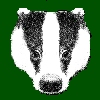 |
www.badgerland.co.uk |
| News about Badgers in the UK |
| Home | Shop | Animals | Pictures | Help | Seeing | Groups | Education | News | Search | Books |
| Badgerland | External | 2010 | 2009 | 2008 | 2007 | 2006 | 2005 | 2004 | 2003 | 2002 | 2001 | 2000 | 1999 | 1998 | 1997 | 1996 |
|
|
|
Farmers fear cattle TB crisis
ITN - 10th January 2001The Government is considering several ways of controlling badgers.Farmers are becoming increasingly concerned about the spread of TB in cattle, according to a Commons report. An all-party committee of MPs said delays in deciding if badgers were to blame for spreading the disease was adding to the pressure. The Government is considering several ways of controlling badgers but will not implement them until trials lasting several years have been completed. The report from the Agriculture Committee said farmers were feeling a "growing sense of desperation". The Government has a five-point research programme and control strategy to tackle TB in cattle. At its centre is the Krebs programme which includes a controversial badger-culling trial. Three different badger control methods are being compared, including proactive culling, reactive culling following the discovery of bovine TB in herds, and surveys. But the MPs said the timetable had slipped from that projected by the original Krebs report and described the delay as "regrettable." Their report warned: "While we accept the Independent Scientific Group's assurance that the trial is now on track and it may be as early as 2002 that we have some useful hard data that can be usefully translated into policy options, it remains the case that results are not likely to be available until 2004: that is seven years after the publication of the Krebs report in December 1997. "This delay puts even greater pressure on those farmers whose support for the trial is vital to its success but whose sense of desperation is growing as bovine TB in cattle continues to spread." The report added: "We reiterate our support for the trial as the only feasible way of obtaining information essential to establishing the relationship between bovine TB in cattle and badgers and whether culling is a viable policy option, and reaffirm our belief that it is in the wider interests of the farming community, as well as in the long-term interests of conservation and animal welfare organisations, to co-operate fully with the trial. "There are lessons to be learnt from the slow implementation of the trial but nothing to be gained, from abandoning it before it has had time to achieve robust results." Naturalist Martin Hancox was a member of a Government consultative panel that examined the issue. He told ITN: "The problem is it is very much political. I have been barred from the TB forum. In cattle it is now back to 1960s levels and the Government is still very reluctant to take the necessary steps. He said he is very sympathetic to farmers who feel frustrated about the fact that where there are cows with TB there are also badgers with TB, but said: "The Krebs review found that there is no actual proof that badgers can give TB to cattle. There is actually a lot of evidence that it is the other way around, of badgers catching it from the cattle. Mr Hancox added: "The sooner the cull stops the better. Britain had a textbook TB scheme into the mid 1970s, which was annual testing of all cattle and a ban on cattle movement. Until they go back to that regime, there will be absolutely no progress whatsoever." Trials continueCases of TB-infected cattle have soared in recent years and farmers believe badgers are responsible for the spread of the disease to their cows. Just over two years ago the Government set up five-year trials in 10 "hot spot" regions of the country where 12,500 badgers would be exterminated, to see if there was a relationship between badgers and bovine TB in cattle. Some animal rights activists have used direct action to destroy traps. Protesters claim there has never been any firm scientific evidence to prove the link between badgers and TB in cattle. The Ministry of Agriculture, Fisheries and Food agreed to trials to test the effectiveness of different badger culling policies as part of its five-point strategy in the research and control of tuberculosis, recommended by the Krebs report of 1997. Activists claim that badgers are being killed during the mating season and cubs are being left underground, and that other animals are being caught in badger traps. MAFF says badgers are not culled between February 1 and April 30, to protect dependent cubs, as recommended by the Independent Scientific Group, the advisory group on bovine TB, which designed the trial. MAFF also says the cull will not have any effect on the badger population, which is an estimated 300,000 in Great Britain. It says 50,000 badgers are killed crossing roads each year. MAFF is spending £1.4 million a year on developing a vaccine for bovine TB plus £4 million a year on other research into the disease, excluding the trial. The cost of the trial this year is believed to be almost £7 million.
|
|||||||||||||||||||||||||||||||||||